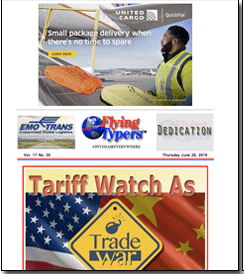 Tariff Dustup Could Be Tariff Dustup Could Be
Cargo Windfall
Everyone
I talk with in air cargo is concerned
about the effect of President Trump’s
stance on tariffs, and to tell the truth
so was I until I remembered one thing:
Donald
Trump is a master negotiator rather
than a politician.
For
the past 60+ years the United States
has been giving trade concessions in
return for geopolitical concessions
like military bases and alliances.
So
Trump is right in saying our trade deals
are outdated and need to be changed.
But
it is difficult to change anything unless
you create an environment where the
other party with which you are negotiating
feels you will truly enact draconian
changes.
So
do I believe that what Trump is asking
for is what he really wants?
No!
No
Tariff Cargo Windfall?
The
Trump Administration may even be looking
for no tariffs between some of our major
trading partners.
If
that were to happen air cargo will see
the biggest growth in history.
On
the other hand, if Trump is successful
in moving countries to lower their tariffs
on U.S. goods, and the United States
backs off the draconian measures Trump
is voicing, that will also be beneficial
to air cargo, because it will even out
the flow and increase the round trip
yield.
China:
A Horse of a Different Color
Now,
China is another story, because it involves
more than trade.
The
big issue with China includes protection
of our patents and intellectual property.
There
is also the matter of China continuing
to trade and support North Korea.
This
one can go either way and is the one
to watch very carefully as the negotiations
will be much more complex.
President
Trump understands the importance of
trade to the U.S. as well as to the
global economy that he does not want
to collapse.
He
will make a deal with our trading partners
but may give in a little more to China
in the negotiations in return for supporting
his position on North Korea.
My
advice to air cargo is to stop worrying.
Look
at the landscape.
Business
is booming and President Donald Trump
is a business professional and not a
politician in the traditional sense,
and he simply wants a better deal for
the United States.
Bill
Boesch
CEO/President
Cargo Logistics Solutions
 Only
Time Will Tell Only
Time Will Tell
Imposing
Tariffs is one way of protecting local
economies.
Of
course on a cross country basis this
could lead to retaliation from the opposite
country, which in the case of the U.S.,
it certainly has with both China and
India doing a tit for tat.
It
is a bit of a wonder as to why the U.S.
has been more prone to protectionism
as compared to other advanced economies,
but I guess they have their reasons.
Cross
country trade development involves years
and years of diplomatic/political efforts.
Tariffs
lead to turmoil not only in the imposing
market place but also in other related
global economies.
No
Immediate Impact
Shipping
will not get impacted on an immediate
basis but shipping trade lanes could
see a change.
Our
customers are exploring options, but
shipping “via” is never
an easy one; trade cannot be the same,
as logistics costs mount up and in today’s
thin yield environment, this could be
difficult. High-value products will
probably seek alternative ways, yes,
but sparingly.
China
is one of the largest suppliers to the
United States, and so is India, and
both are looking at tariff barriers.
India
preaches the virtues of free trade but
finds it difficult to practice the same
due to the nature of the country’s
trade deficits.
U.S.
auto giants have already written to
the Indian Finance Minister to reconsider
some of the tariffs imposed as these
tariffs will have serious consequences
for their business in India, where they
have made significant investments.
affect
I
am not a politician nor an economist,
so I am not sure how this will pan out,
but such trade restrictions have an
effect in the long run; good or bad,
time will tell.
It
is one thing to protect local U.S.-based
manufacturers and quite another when
the company is operating overseas–
for e.g. China is one of the biggest
markets for General Motors.
As
a result of China imposing tariffs on
U.S. manufacturing companies, GM is
looking at a huge reduction in manpower
due to loss of business! The result
is loss of jobs.
The
U.S. Soya bean sector is facing the
same situation. China is striking back!
Life
Will Go On
Manufacturing
constitutes only 15% of the GDP of the
U.S. economy. The U.S. became a service
economy long, long ago; so at first
glance it is difficult to comprehend
what is going on but as I said, I’m
no economist and only time will tell.
One
can do without a pair of branded shoes
or handbags, but daily needs are necessities
of life.
Therefore,
nothing stops and life will go on, and
hopefully wisdom will prevail soon.
Keshav R. Tanna
Managing Director, Links Cargo Agencies
Pvt Ltd.
Chairperson, Air Freight Institute,
FIATA
|




 Vol.
17 No. 39
Vol.
17 No. 39 Vol.
17 No. 40
Vol.
17 No. 40